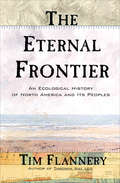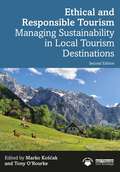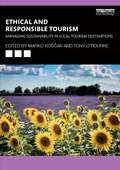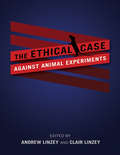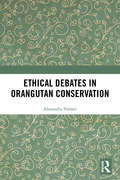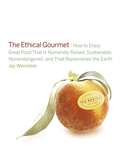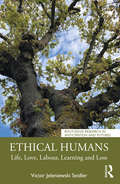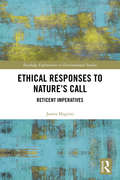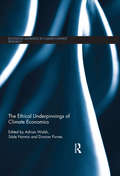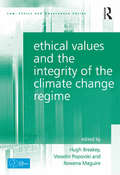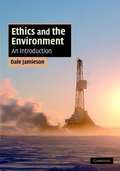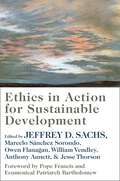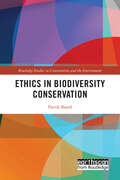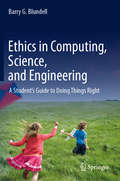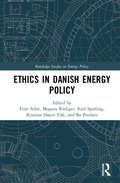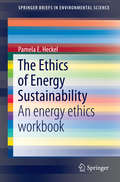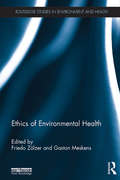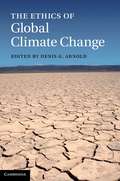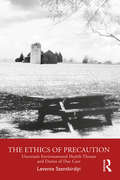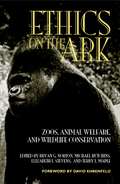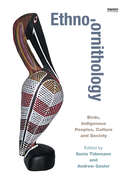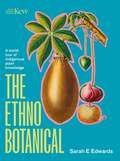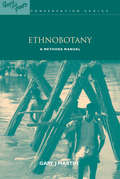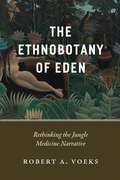- Table View
- List View
The Eternal Frontier: An Ecological History of North America and Its Peoples
by Tim FlannerySixty-five million years ago, a meteor six miles wide smashed into the Gulf of Mexico, ending the age of dinosaurs and devastating the North American continent. Starting with this catastrophic event, The Eternal Frontier recounts the extraordinary ecological history of North America, showing how the continent originally came into being and eventually transformed into the landscape we know today. This sweeping, multidisciplinary book is history on an epic scale. Tim Flannery, a world-renowned paleontologist, traces the postmeteor rebirth of plants, animals, climate, and landforms. He describes a time when rain forests flourished in Greenland and when giant long-necked camels and fat aquatic rhinos thrived in North America’s golden age. He explores the massive changes wrought by the ice ages and shows how geological and climatic forces shaped both the autumn foliage in New England and the cacti in the Sonoran Desert. As the story moves across vast distances of time and geography, we eventually witness the impact of the human race. Flannery imagines the first humans to have immigrated 14,000 years ago, after the recession of the last ice age, and he explains how the pioneering Clovis hunters exterminated an ice-age fauna, including enormous mammoths and mastodons and half-ton lions. The story continues right up to the present, covering the deforestation of the Northeast, the decimation of the buffalo, and other facets of the impact of frontier settlement and the development of modern industry and commerce. The Eternal Frontier is science writing at its best, combining an enormous wealth of fascinating information with engaging prose that will be accessible to readers of any background.
Ethical Adaptation to Climate Change
by Allen Thompson Jeremy Bendik-KeymerPredictions about global climate change have produced both stark scenarios of environmental catastrophe and purportedly pragmatic ideas about adaptation. This book takes a different perspective, exploring the idea that the challenge of adapting to global climate change is fundamentally an ethical one, that it is not simply a matter of adapting our infrastructures and economies to mitigate damage but rather of adapting ourselves to realities of a new global climate. The challenge is to restore our conception of humanity--to understand human flourishing in new ways--in an age in which humanity shapes the basic conditions of the global environment. In the face of what we have unintentionally done to Earth's ecology, who shall we become? The contributors examine ways that new realities will require us to revisit and adjust the practice of ecological restoration; the place of ecology in our conception of justice; the form and substance of traditional virtues and vices; and the organizations, scale, and underlying metaphors of important institutions. Topics discussed include historical fidelity in ecological restoration; the application of capability theory to ecology; the questionable ethics of geoengineering; and the cognitive transformation required if we are to "think like a planet. "
Ethical and Responsible Tourism: Managing Sustainability in Local Tourism Destinations
by Marko KoščakEthical and Responsible Tourism explains the methods and practices used to manage the environmental impact of tourism on local communities and destinations. This new edition takes into account recent global events such as the Covid-19 health crisis, the impacts of the war in Ukraine on tourism in neighbouring regions and the consequences of the energy and cost of living crisis. The three core themes of the book – destination management, environmental and social aspects of ethical sustainable development and business impacts – are discussed across both topic and case study chapters, alongside explanatory editorial analysis with all chapters clearly signposted and interlinked. The case studies address specific and practical examples from a global range of examples including sites in Australasia, Central America, Europe, Asia, North America and South America. In this new edition, further case studies are included from the USA and Japan, as well as new examples from Brazil, Croatia and Malta. Used as a core textbook, the linking of theory in the topic chapters, and practice gained through case studies, alongside further reading and editorial commentary, Ethical and Responsible Tourism provides a detailed and comprehensive learning experience. Specific case studies can be used as standalone examples as part of a case teaching approach, and the editorial and discussion elements are designed to be suitable for those simply seeking a concise overview, such as tourism professionals or potential investors in sustainable tourism projects. This revised edition continues to be essential reading for students, researchers and practitioners of tourism, environmental and sustainability studies.
Ethical and Responsible Tourism: Managing Sustainability in Local Tourism Destinations
by Tony O'Rourke Marko Kos AkEthical and Responsible Tourism explains the methods and practices used to manage the environmental impact of tourism on local communities and destinations. The three core themes of the book – destination management, environmental and social aspects of ethical sustainable development and business impacts – are discussed across both topic and case study chapters, alongside explanatory editorial analysis with all chapters clearly signposted and interlinked. The case studies address specific and practical examples from a global range of examples including sites in Australia, Central America, Europe Union countries, Japan, North America and South America. Used as a core textbook, the linking of theory in the topic chapters, and practice gained through case studies, alongside further reading and editorial commentary, Ethical and Responsible Tourism provides a detailed and comprehensive learning experience. Specific case studies can be used as standalone examples as part of a case teaching approach, and the editorial and discussion elements are designed to be suitable for those simply seeking a concise overview, such as tourism professionals or potential investors in sustainable tourism projects. This book will be essential reading for students, researchers and practitioners of tourism, environmental and sustainability studies.
The Ethical Case against Animal Experiments
by Andrew Linzey Clair LinzeyAt present, human beings worldwide are using an estimated 115.3 million animals in experiments ”a normalization of the unthinkable on an immense scale. In terms of harm, pain, suffering, and death, animal experiments constitute one of the major moral issues of our time. Given today's deeper understanding of animal sentience, we must afford animals a special moral consideration that precludes their use in experiments. The Ethical Case against Animal Experiments begins with a groundbreaking and comprehensive ethical critique of the practice of animal experiments by the Oxford Centre for Animal Ethics. A second section offers original writings that engage with, and elaborate on, aspects of the Oxford Centre report. The essayists explore historical, philosophical, and personal perspectives that range from animal experiments in classical times to the place of necessity in animal research to one researcher's painful journey from researcher to opponent. A devastating look at a contemporary moral crisis, The Ethical Case against Animal Experiments melds logic to compassion to mount a powerful challenge to human cruelty.
Ethical Debates in Orangutan Conservation
by Alexandra PalmerEthical Debates in Orangutan Conservation explores how conservationists decide whether, and how, to undertake rehabilitation and reintroduction (R&R) when rescuing orphaned orangutans. The author demonstrates that exploring ethical dilemmas is crucial for understanding ongoing disagreements about how to help endangered wildlife in an era of anthropogenic extinction. Although R&R might appear an uncontroversial activity, there is considerable debate about how, and why, it ought to be practised. Drawing on in-depth qualitative research with orangutan conservation practitioners, this book examines how ethical trade-offs shape debates about R&R. For example, what if the orphan fails to learn how to be an orangutan again, after years in the company of humans? What if she is sent into the forest only to slowly starve? Would she have been better off in a cage? Could the huge cost of sending a rescued ape back to the wild be better spent on stopping deforestation in the first place? Or do we have a moral obligation to rescue the orphan regardless of cost? This book demonstrates that deconstructing ethical positions is crucial for understanding ongoing disagreements about how to help our endangered great ape kin and other wildlife. Ethical Debates in Orangutan Conservation is essential reading for those interested in conservation and animal welfare, animal studies, primatology, geography, environmental philosophy, and anthropology.
The Ethical Gourmet: How to Enjoy Great Food That Is Humanely Raised, Sustainable, Nonendangered and That Replenishes the Earth
by Jay WeinsteinMore and more of us want to ensure that what we eat doesn't deplete resources, cause animal or human suffering, or lead to pollution. And, at the same time, we also want delicious food! If you are concerned about the environment, but unsure how to make a difference, here is a handbook for finding and cooking environmentally friendly and ethically produced foods. Chef and environmentalist Jay Weinstein has written the bible for those who care about both the well-being of the world and flavorful food. He informs us: * When organics really matter * Where to source humanely-raised meats and other ethically produced foods * How to make choices with a clean conscience when dining out. He also explores subjects ranging from genetically modified foods to being savvy about farmed fish, and why to avoid disposable wooden chopsticks and bottled water. By providing 100 healthy, sophisticated, and mouthwatering recipes, Jay Weinstein ensures that our ethical impulses are well rewarded. Dishes like Manchego-Potato Tacos with Pickled Jalapeños, Zucchini Spaghetti with Garlicky Clams and Grilled Bluefish, Pumpkin Basmati Rice Pilaf, and Coco-Vegetable Rice with Tamarind Chicken Skewers feature creative ways to use eco-friendly vegetables and legumes, sustainable seafood, and humanely raised animals.
Ethical Humans: Life, Love, Labour, Learning and Loss (Routledge Research in Anticipation and Futures)
by Victor Jeleniewski SeidlerEthical Humans questions how philosophy and social theory can help us to engage the everyday moral realities of living, working, loving, learning and dying in new capitalism. It introduces sociology as an art of living and as a formative tradition of embodied radical eco post-humanism. Seeking to embody traditions of philosophy and social theory in everyday ethics, this book validates emotions and feelings as sources of knowledge and shows how the denigration of women has gone hand in hand with the denigration of nature. It queries post-structuralist traditions of anti-humanism that, for all their insights into the fragmentation of identities, often sustain a distinction between nature and culture. The author argues that in a crisis of global warming, we have to learn to listen to our bodies as part of nature and draws on Wittgenstein to shape embodied forms of philosophy and social theory that questions theologies that tacitly continue to shape philosophical traditions. In acknowledging our own vulnerabilities, we question the vision of the autonomous and independent rational self that often remains within the terms of dominant white masculinities. This book offers different modes of self-work, drawing on psychoanalysis and embodied post-analytic psychotherapies as part of a decolonising practice questioning Eurocentric colonising modernity. In doing so it challenges, with Simone Weil, Roman notions of power and greatness that have shaped visions of white supremacy and European colonial power and empire. This book will be of great interest to students and scholars of environmental ethics, environmental philosophy, social theory and sociology, ethics and philosophy, cultural studies, future studies, gender studies, post-colonial studies, Marxism, psychoanalysis and psychotherapy and philosophy and sociology as arts of living.
Ethical Responses to Nature’s Call: Reticent Imperatives (Routledge Explorations in Environmental Studies)
by James MagriniArguing for a renewed view of objects and nature, Ethical Responses to Nature’s Call considers how it is possible to understand our ethical duties - in the form of ethical intuitionalism - to nature and the planet by listening to and releasing ourselves over to the call or address of nature. Blending several strands of philosophical thought, such as Graham Harman’s Object-Oriented Ontology, W. D. Ross’s prima fathics, Alphonso Lingis’s phenomenological ethics traceable to The Imperative, and Michael Bonnett’s ecophilosophy, this book offers a unique rejoinder to the problems and issues that continue to haunt humans’ relationship to nature. The origins of such problems and issues largely remain obscured from view due to the oppressive influence of the "Cultural Framework" which gives form and structure to the ways we understand, discourse on, and comport ourselves in relation to the natural world. Through understanding this "Cultural Framework" we also come to know the responses we continue to offer in answer to nature’s call and address, and are then in a position to analyze and assess those responses in terms of their potential ethical weight. Such a phenomenon is made possible through the descriptive-and-interpretive method of eco-phenomenology. This renewed vision of the human-and-nature provides direction for our interaction with and behavior toward nature in such a way that the ethical insight offers a diagnosis and provides a potentially compelling prescriptive for environmental ills.
The Ethical Underpinnings of Climate Economics (Routledge Advances in Climate Change Research)
by Adrian Walsh Säde Hormio Duncan PurvesDespite their obvious importance, the ethical implications of climate change are often neglected in economic evaluations of mitigation and adaptation policies. Economic climate models provide estimates of the value of mitigation benefits, provide understanding of the costs of reducing emissions, and develop tools for making policy choices under uncertainty. They have thus offered theoretical and empirical instruments for the design and implementation of a range of climate policies, but the ethical assumptions included in the calculations are usually left unarticulated. This book, which brings together scholars from both economics and ethical theory, explores the interrelation between climate ethics and economics. Examining a wide range of topics including sustainability, conceptions of value, risk management and the monetization of harm, the book will explore the ethical limitations of economic analysis but will not assume that economic theory cannot accommodate the concerns raised. The aim in part is to identify ethical shortcomings of economic analysis and to propose solutions. Given the on-going role of economics in government thinking on mitigation, a constructive approach is vital if we are to deal adequately with climate change. This volume will be of great interest to students and scholars of environmental ethics, economics, political science, political philosophy and the philosophy of economics.
Ethical Values and the Integrity of the Climate Change Regime (Law, Ethics and Governance)
by Hugh Breakey Vesselin PopovskiThis book investigates the ethical values that inform the global carbon integrity system, and reflects on alternative norms that could or should do so. The global carbon integrity system comprises the emerging international architecture being built to respond to the climate change. This architecture can be understood as an 'integrity system'- an inter-related set of institutions, governance arrangements, regulations and practices that work to ensure the system performs its role faithfully and effectively. This volume investigates the ways ethical values impact on where and how the integrity system works, where it fails, and how it can be improved. With a wide array of perspectives across many disciplines, including ethicists, philosophers, lawyers, governance experts and political theorists, the chapters seek to explore the positive values driving the global climate change processes, to offer an understanding of the motivations justifying the creation of the regime and the way that social norms impact upon the operation of the integrity system. The collection focuses on the nexus between ideal ethics and real-world implementation through institutions and laws. The book will be of interest to policy makers, climate change experts, carbon taxation regulators, academics, legal practitioners and researchers.
Ethics and the Environment: An Introduction
by Dale JamiesonThis book is an introduction to the philosophical issues involved in this important question, focussing primarily on ethics but also encompassing questions in aesthetics and political philosophy. Topics discussed include the environment as an ethical question, human morality, meta-ethics, normative ethics, humans and other animals, the value of nature, and nature's future.
Ethics in Action for Sustainable Development
by Sachs, Jeffrey D.; Sorondo, Marcelo Sánchez; Flanagan, Owen; Vendley, William; Annett, Anthony; Thorson, JesseThe Sustainable Development Goals, adopted by the United Nations in 2015, comprise an ambitious and sweeping agenda that unites economic, social, and environmental aims. What resources do the world’s religious and secular traditions offer in support of these objectives? Which principles do these traditions hold in common, and how can these shared values help advance global goals?This book presents an in-depth and deeply engaged conversation among interfaith religious leaders and interdisciplinary scholars and practitioners in pursuit of an ethical consensus that could ground sustainable development efforts. Drawing on more than two years of close-knit discussions convened by Jeffrey D. Sachs and Marcelo Sánchez Sorondo, it offers an extensive and inclusive vision of how to promote human flourishing. The book features theological, philosophical, and ethical deliberations of great diversity and depth on the challenges of sustainable development, addressing questions of poverty, environmental justice, peace, conflict, and the future of work. It includes consensus statements on the moral imperatives of sustainable development, introductions to seven major religious traditions and their conceptions of the common good, and thematic reflections. Wide-ranging and urgent, this book represents a major contribution to interreligious dialogue and to the articulation of a shared global ethics.The book features a foreword by Pope Francis and Ecumenical Patriarch Bartholomew.
Ethics in Biodiversity Conservation (Routledge Studies in Conservation and the Environment)
by Patrik BaardThis book examines the role of ethics and philosophy in biodiversity conservation. The objective of this book is two-fold: on the one hand it offers a detailed and systematic account of central normative concepts often used, but rarely explicated nor justified, within conservation biology. Such concepts include ‘values’ (both intrinsic, instrumental, and, more recently, relational), ‘rights’, and ‘duties’. The second objective is to emphasize to environmental philosophers and applied ethicists the many interesting decision-making challenges of biodiversity conservation. The book argues that a nuanced account of instrumental values provides a powerful tool for reasoning about the values of biodiversity. It also scrutinizes relational values, the concept of rights of nature, and risk, and show how moral philosophy proves indispensable for these concepts. Consequently, it engages with recent suggestions on normative aspects of biodiversity conservation, and show the need for moral philosophy in biodiversity conservation. The overriding aim of this book is to provide conservation biologists and policy-makers with a systematic overview of concepts and assessments of the reasons for reaching prescriptive conclusions about biodiversity conservation. This will prove instrumental in clarifying the role of applied ethics and a refined understanding of the tools it can provide. This title will be of interest to students and scholars of conservation biology, conservation policy, environmental ethics and environmental philosophy.
Ethics in Computing, Science, and Engineering: A Student’s Guide to Doing Things Right
by Barry G. BlundellThis comprehensive textbook introduces students to the wide-ranging responsibilities of computing, science and engineering professionals by laying strong transdisciplinary foundations and by highlighting ethical issues that may arise during their careers. The work is well illustrated, and makes extensive use of both activities, and ethical dilemmas which are designed to stimulate reader engagement. A number of memorable case studies are also included and frequently draw on the demanding aerospace industry. The book adopts a strongly human centric approach, with matters such as privacy erosion and censorship being viewed not only in their current context but also in terms of their ongoing evolution. What are our individual ethical responsibilities for ensuring that we do not develop for future generations a technological leviathan with the potential to create a dystopian world? A broad range of technologies and techniques are introduced and are examined within an ethical framework. These include biometrics, surveillance systems (including facial recognition), radio frequency identification devices, drone technologies, the Internet of Things, and robotic systems. The application and potential societal ramifications of such systems are examined in some detail and this is intended to support the reader in gaining a clear insight into our current direction of travel. Importantly, the author asks whether we can afford to allow ongoing developments to be primarily driven by market forces, or whether a more cautious approach is needed. Further chapters examine the benefits that are associated with ethical leadership, environmental issues relating to the technology product lifecycle (from inception to e-waste), ethical considerations in research (including medical experimentation involving both humans and animals), and the need to develop educational programs which will better prepare students for the needs of a much more fluid employment landscape. The final chapter introduces a structured approach to ethical issue resolution, providing a valuable, long-term source of reference. In addition it emphasises the ethical responsibilities of the professional, and considers issues that can arise when we endeavour to effect ethically sound change within organisations. Examples are provided which highlight the possible ramifications of exercising ethical valour. The author has thus created an extensively referenced textbook that catalyses student interest, is internationally relevant, and which is multicultural in both its scope and outlook.
Ethics in Danish Energy Policy (Routledge Studies in Energy Policy)
by Finn Arler Mogens Rüdiger Karl Sperling Kristian Høyer Toft Bo PoulsenThis book deepens our understanding of ethical drivers in energy policy and contributes to future decision-making on transitions towards a sustainable energy system. During the latest fifty years Western energy politics have been faced with a series of ethical challenges including rapid growth, oil crises, security of supply, nuclear power and climate change. Combining philosophical, historical and planning approaches into one narrative, these dilemmas are explored using Denmark as the key case study. Drawing on contributions from several experts in the field, the ethics of energy is investigated from multiple perspectives at the individual, corporate, local and national levels, focusing on concrete decisions where different ethical considerations are weighted against each other. This comprehensive approach helps to gain a deeper understanding of the energy sector’s history and gives important input to its future layout. Drawing comparisons with European and global examples, this book will be of great interest to students and scholars of energy politics and policy, environmental ethics, climate change and sustainability transitions.
The Ethics of Energy Sustainability
by Pamela E. HeckelThis book is an easy to use instructional aide. Explore sustainability issues in contemporary society through a transdisciplinary approach. Chapters include ethics, public resources, public policy, combustion, heat exchangers, nuclear, solar, water, and wind energy. A short summary is presented for each topic, followed by additional topics for research, assignments, and references. The complex assignments require students to grow in their professional judgment.
Ethics of Environmental Health (Routledge Studies in Environment and Health)
by Friedo Zölzer Gaston MeskensEnvironmental health encompasses the assessment and control of those environmental factors that can potentially affect human health, such as radiation, toxic chemicals and other hazardous agents. It is often assumed that the assessment part is just a matter of scientific research, and the control part a matter of implementing standards which unambiguously follow from that research. But it is less commonly understood that environmental health also requires addressing questions of an ethical nature. How can we determine the "acceptable" risk level for the general population or for certain groups? How should we deal with uneven distributions of risks and benefits? How do we communicate about risks with the stakeholders? This multidisciplinary collection brings together a number of leading researchers and scholars in order to generate discussion surrounding these key questions, and to bring the ethical implications of science and technology to the forefront of critical thought. Providing a broad overview of the Ethics of Environmental Health, its philosophical foundations and practical applications, this book offers a significant contribution to ongoing discussions in sustainable development and will be of interest to scholars and practitioners of Environmental Health, urban studies and healthcare.
The Ethics of Global Climate Change
by Denis G. ArnoldGlobal climate change is one of the most daunting ethical and political challenges confronting humanity in the twenty-first century. The intergenerational and transnational ethical issues raised by climate change have been the focus of a significant body of scholarship. In this new collection of essays, leading scholars engage and respond to first-generation scholarship and argue for new ways of thinking about our ethical obligations to present and future generations. Topics addressed in these essays include moral accountability for energy consumption and emissions, egalitarian and libertarian perspectives on mitigation, justice in relation to cap and trade schemes, the ethics of adaptation and the ethical dimensions of the impact of climate change on nature.
The Ethics of Precaution: Uncertain Environmental Health Threats and Duties of Due Care
by Levente SzentkirályiThere are thousands of substances manufactured in the United States to which the public is routinely exposed and for which toxicity data are limited or absent. Some insist that uncertainty about the severity of potential harm justifies implementing precautionary regulations, while others claim that uncertainty justifies the absence of regulations until sufficient evidence confirms a strong probability of severe harm. In this book, Levente Szentkirályi overcomes this impasse in his defense of precautionary environmental risk regulation by shifting the focus from how to manage uncertainty to what it is we owe each other morally. He argues that actions that create uncertain threats wrongfully gamble with the welfare of those who are exposed and neglect the reciprocity that our equal moral standing demands. If we take the moral equality and rights of others seriously, we have a duty to exercise due care to strive to prevent putting them in possible harm’s way. The Ethics of Precaution will be of great interest to researchers, educators, advanced students, and practitioners working in the fields of environmental political theory, ethics of risk, and environmental policy.
Ethics on the Ark: Zoos, Animal Welfare, and Wildlife Conservation
by Terry Maple Elizabeth Stevens Michael Hutchins Bryan G. NortonEthics on the Ark presents a passionate, multivocal discussion--among zoo professionals, activists, conservation biologists, and philosophers--about the future of zoos and aquariums, the treatment of animals in captivity, and the question of whether the individual, the species, or the ecosystem is the most important focus in conservation efforts. Contributors represent all sides of the issues. Moving from the fundamental to the practical, from biodiversity to population regulation, from animal research to captive breeding, Ethics on the Ark represents an important gathering of the many fervent and contentious viewpoints shaping the wildlife conservation debate.From the Trade Paperback edition.
Ethno-ornithology: Birds, Indigenous Peoples, Culture and Society
by Sonia Tidemann Andrew GoslerIndigenous knowledge that embraces ornithology takes in whole social dimensions that are inter-linked with environmental ethos, conservation and management for sustainability. In contrast, western approaches have tended to reduce knowledge to elemental and material references. This book looks at the significance of indigenous knowledge of birds and their cultural significance, and how these can assist in framing research methods of western scientists working in related areas. As well as its knowledge base, this book provides practical advice for professionals in conservation and anthropology by demonstrating the relationship between mutual respect, local participation and the building of partnerships for the resolution of joint problems. It identifies techniques that can be transferred to different regions, environments and collections, as well as practices suitable for investigation, adaptation and improvement of knowledge exchange and collection in ornithology. The authors take anthropologists and biologists who have been trained in, and largely continue to practise from, a western reductionist approach, along another path - one that presents ornithological knowledge from alternative perspectives, which can enrich the more common approaches to ecological and other studies as well as plans of management for conservation.
The Ethnobotanical: A world tour of Indigenous plant knowledge
by Dr Sarah EdwardsSince the beginning of humanity's existence, plants have provided us with everything we need for our survival - they sustain us with air to breathe, food to eat, materials to make clothes and shelter with, and medicine to treat and prevent disease. Their beauty can also enhance our mood and provide spiritual and emotional nourishment.Western science has 'discovered' and named innumerable plant species over the course of its colonial history. To many Indigenous peoples, however, plants have been recognised for centuries as sentient beings, imbued with spirit and agency to help humanity. Publishing in partnership with the Royal Botanic Gardens at Kew, The Ethnobotanical offers a unique and beautiful perspective on plants and their roles in the lives of peoples from across the planet.
Ethnobotany: A Methods Manual (People and Plants International Conservation)
by Gary J. MartinEthnobotany, the study of the classification, use and management of plants by people, draws on a range of disciplines, including natural and social sciences, to show how conservation of plants and of local knowledge about them can be achieved. Ethnobotany is critical to the growing importance of developing new crops and products such as drugs from traditional plants. This book is the basic introduction to the field, showing how botany, anthropology, ecology, economics and linguistics are all employed in the techniques and methods involved. It explains data collection and hypothesis testing and provides practical ideas on fieldwork ethics and the application of results to conservation and community development. Case studies illustrate the explanations, demonstrating the importance of collaboration in achieving results. Published with WWF, UNESCO and Royal Botanic Gardens Kew.
The Ethnobotany of Eden: Rethinking the Jungle Medicine Narrative
by Robert A. VoeksIn the mysterious and pristine forests of the tropics, a wealth of ethnobotanical panaceas and shamanic knowledge promises cures for everything from cancer and AIDS to the common cold. To access such miracles, we need only to discover and protect these medicinal treasures before they succumb to the corrosive forces of the modern world. A compelling biocultural story, certainly, and a popular perspective on the lands and peoples of equatorial latitudes—but true? Only in part. In The Ethnobotany of Eden, geographer Robert A. Voeks unravels the long lianas of history and occasional strands of truth that gave rise to this irresistible jungle medicine narrative. By exploring the interconnected worlds of anthropology, botany, and geography, Voeks shows that well-intentioned scientists and environmentalists originally crafted the jungle narrative with the primary goal of saving the world’s tropical rainforests from destruction. It was a strategy deployed to address a pressing environmental problem, one that appeared at a propitious point in history just as the Western world was taking a more globalized view of environmental issues. And yet, although supported by science and its practitioners, the story was also underpinned by a persuasive mix of myth, sentimentality, and nostalgia for a long-lost tropical Eden. Resurrecting the fascinating history of plant prospecting in the tropics, from the colonial era to the present day, The Ethnobotany of Eden rewrites with modern science the degradation narrative we’ve built up around tropical forests, revealing the entangled origins of our fables of forest cures.
